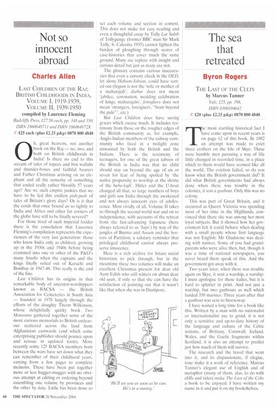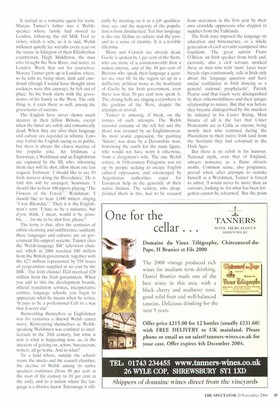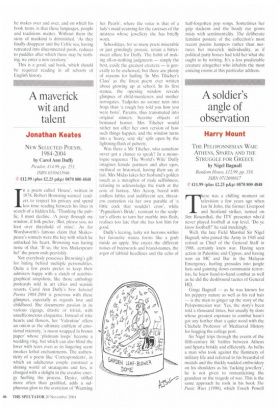The sea that retreated
Byron Rogers
THE LAST OF THE CELTS by Marcus Tanner Yale, £25, pp. 398,
ISBN 0300104642
£20 (plus /2.25 p&p) 0870 800 4848
The most startling historical fact I have come upon in recent years is on page 62 of this book. In 1882 an attempt was made to evict three crofters on the Isle of Skye. These were humble men pursuing a way of life little changed in recorded time, in a place which to them would have seemed like all the world. The eviction failed, so do you know what the British government did? It did what British governments had always done when there was trouble in the colonies, it sent a gunboat. Only this was no colony.
This was part of Great Britain, and it occurred as Queen Victoria was spending most of her time in the Highlands, convinced that there she was among her most loyal subjects. But it showed how her government felt it could behave when dealing with a small people whose first language was not English: Mr Gladstone was dealing with natives. Some of you had grandparents who were alive then, but, though it was a time of national newspapers, you never heard them speak of this. And the government got away with it.
Two years later, when there was trouble again on Skye, it sent a warship, a warship. I must apologise for these italics, but it is hard to splutter in print. And not just a warship, but two gunboats as well which landed 350 marines. Three years after that a gunboat was sent to Stornoway.
I have waited a long time for a book like this. Written by a man with no nationalist or internationalist axe to grind, it is not only a sensitive and up-to-date history of the language and culture of the Celtic nations, of Brittany, Cornwall, Ireland, Wales, and the Gaelic fragments within Scotland, it is also an attempt to predict just how much of them will survive.
The research and the travel that went into it, and its dispassionate, if elegiac, tone make it a work of reference. Marcus Tanner's elegant use of English and of metaphor (many of them, alas, to do with cliffs and tides) make The Last of the Celts a book to be enjoyed. I have written my name in it and put it on my bookshelves. It started as a romantic quest for roots. Marcus Tanner's father was a Welshspeaker whose family had moved to London, following the old Milk Trail to riches, which is why, so it is said, Welsh milkmen quietly lay wreaths every year on the statue in Islington of their Elizabethan countryman, Hugh Middleton, the man who brought the New River, and water, to London. Work that out for yourselves. Marcus Tanner grew up in London, where, so he tells us, being short, dark and emotional (though I would have thought most cockneys were this anyway), he felt out of place. So his hook starts with the gravestones of his family in the West. The only thing is, it ends there as well, among the gravestones of nations.
The English have never shown much interest in their fellow Britons, except when the latter are safely and romantically dead. When they are alive their language and culture arc regarded as whimsy. Laws may forbid the English saying so in public, but there is always the cloaca maxima of the popular joke. An Irishman, a Scotsman, a Welshman and an Englishman are captured by the SS, who, informing them they will be shot, allow them one last request. Irishman: 'I should like to see 50 Irish dancers doing the Riverdance: He is told this will be arranged. Scotsman: 'I should like to hear 100 pipers playing "The Flowers of the Forest".' Welshman: 'I should like to hear 1,000 miners singing "Cwm Rhondda": Then it is the Englishman's turn: 'I hate to be a nuisance, but d'you think, I mean, would it he possible .. . for me to be shot first, please?'
The irony is that, after the centuries of ethnic cleansing and indifference, suddenly these languages and cultures are on government life-support systems. Tanner cites the Welsh-language S4C television channel, which in 2004 received £80 million from the British government, together with the £27 million represented by 550 hours of programmes supplied at no cost by the BBC, The Irish channel T04 received £20 million from the Irish government. When you add to this the development boards, official translation services, interpretative centres, language schools, you begin to appreciate what he means when he writes, 'It pays to be a professional Celt in a way that it never did,' Reinventing themselves as Englishmen was for centuries a shrewd Welsh career move. Reinventing themselves as Welshspeaking Welshmen was confined to intellectuals in the 20th century, but what is new is what is happening now, as, in the interests of getting on, actors, bureaucrats, writers, all go home. And to what?
To a land where, outside the schoolroom, the studio and the council chamber, the decline of Welsh among its native speakers continues (from 80 per cent at the start of the century to 18 per cent at the end), and to a nation where the language is a divisive factor. Encourage it offi
cially by insisting on it as a job qualification, say, and the majority of the population is born disinherited. Yet that language is the one lifeline to culture and the past, and to a sense of identity. It is a terrible dilemma.
Manx and Cornish are already dead, Gaelic is spoken by 1 per cent of the Scots, who are more of a commonwealth than a nation anyway, and of the 10 per cent of Bretons who speak their language a quarter are over 60. In the region set up in a deliberate political move as the heartland of Gaelic by the Irish government, even there less than 50 per cent now speak it. The closing bells are ringing everywhere in the gardens of the West, despite the attempts at revival.
Tanner is amusing, if bleak, on the ironies of such attempts. The Welsh national costume of the tall hat and the shawl was invented by an Englishwoman. Its most iconic expression, the painting 'Salem', was done by a Devonshire man, borrowing the outfit for the main figure, who would not have worn it otherwise, from a clergyman's wife. The one Welsh colony, in 19th-century Patagonia, was set up by people seeking to escape English cultural oppression, and encouraged by Argentinian authorities eager for European help in the genocide of their native Indians. The settlers, who disappointed them in this, had to be rescued from starvation in the first year by their own erstwhile oppressors who shipped in supplies from the Falklands.
The Irish state imposed the language on education and bureaucracy, so a whole generation of civil servants scampered into GacIdorn. The great satirist Flann O'Brien, an Irish speaker from birth and, curiously, also a civil servant, mocked these as men who with 'nuns' faces wear bicycle clips continuously, talk in Irish only about the language question and have undue confidence in Irish dancing as a general national prophylactic', Patrick Pearse said that Gaels were distinguished by their otherworldliness and their unique relationship to nature. But that was before they became distinguished by the murders he initiated in his Easter Rising. Most bizarre of all is the fact that Ulster Protestants are as Celtic as anyone, being mostly men who returned during the Plantations to their native Irish land from the Scotland they had colonised in the Dark Ages,
But there is no relish in his humour. National myth, even that of England, attracts nonsense as a flame attracts moths. Common sense, also poignance, prevail when, after attempts to remake himself as a Welshman, Tanner is forced to admit, would never be more than an outsider, looking in, for what has been forgotten cannot be relearned.' But the point he makes over and over, and on which his book turns, is that these languages, people and traditions matter. Without them the story of mankind is diminished. 'As they finally disappear and the Celtic sea, having retreated into disconnected pools, reduces to puddles after which there may be nothing, we enter a new territory.'
This is a good, sad book, which should be required reading in all schools of English history.




























































































 Previous page
Previous page